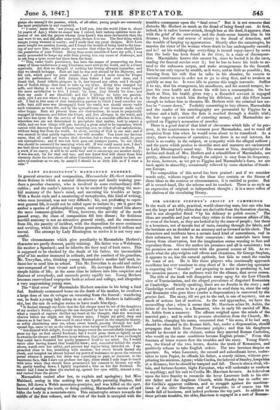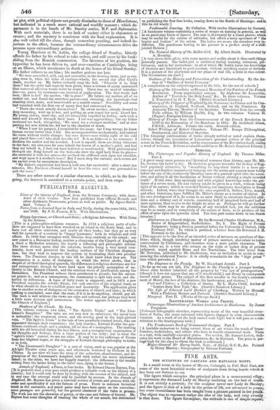SIR GEORGE STEPHEN'S JESUIT AT CAMBRIDGE Is the work of
an able, practical, world-observing man, but one who has not the large and lofty ethics that are derivable from the Socraticse chartse, and is not altogether fitted "by his delicacy to polish courts." The ideas are sensible and just where they relate to the common affairs of life, or even of the heart, as they are looked at by the mass of people ; but there is a looseness, not of morals but of taste, running through the fabric, and the heroines are as decided as an attorney and as forward as his clerk. The characters and incidents have a certain hard kind of naturalness, real in their substance, but not in their connexion : the materials have been drawn from observation, but the imagination seems wanting to fuse and reproduce them. Give the author his premises and all is consistent; but his premises are not consistent with the general course of life. As re- gards what the playwrights call effects and situations, Sir George Stephen, it appears to us, has the natural aptitude, but fails to reach the results for want of art. He is like those players who continually approach excellence but ever continue to stop short of it : the observing spectator is expecting the " thunder " and preparing to assist in producing it, but the occasion passes the audience wait for the climax, that never comes.
The title of the book will disappoint many agog for the Low Church view of Tractarianiam, and the alleged prevalence of disguised Romanist' at Cambridge. Strictly speaking, here are no Jesuits in the story ; and Cambridge would seem to be a ;god place to send them to, since the only real Romanist who goes there (under a dispensation) is converted by the genius loci. The story, till we get to the end, is one of mystery, not so much of actions but of motives. As the end approaches, we have the unravelling clue ; when it seems that Mr. Harrison alias St. Aubin the father of the heroines, is a Romanist, who in early life carried off iglu. St. Aubin from a nunnery. The offence weighed upon the minds of the married pair; and in order to procure absolution from the Church, Mr. St. Aubiu, changing his name, consented that "his sons, if he had any, should be educated in the Roman faith, but, under a dispensation, should propagate that faith from Protestant pulpits ; and that his daughters should be devoted to the cloister, unless they married Roman Catholics, who would on the same conditions become English priests." From this fountain of bitter waters flow the troubles and the story. Young Harri- son, the friend of the two lovers, doubts the truth of Romaniam, and positively refuses to take English orders. The two heroines despise an apostate. So, when Laurence, the second and subordinate lover, under- takes to turn Papist, he offends his father, a sturdy citizen, without pro- pitiating his mistress, Agnes; while Cecilia, the beloved of Stanley, keeps him at a distance, lest he should be tempted and fall. Therein also a rival, vil- lain, and fortune-hunter, hight Farquhar, who will undertake or conform to anything; and his suit to Cecilia Mr. Marrison favours. As it devolves upon the hero Stanley to reconcile the lover Laurence both to his citi- zen father and the Anglican Church, while Stanley has to suffer un- der Cecilia's apparent coldness, and to struggle against the machina- tions of the elder Harrison and of Farquhar, he of coarse has his hands full of business, and indeed performs the top part. In addition to these private troubles, the elder,Harrison is engaged in a sort of Roman- ist-plot, with political objects not greatly dissimilar to those of Hawkitone, but indicated in a much more rational and worldly manner ; which de- partment is in the hands of Mr. Stanley senior, M.P. and diplomatist. With such materials, there is no lack of variety either in characters or events; and the mystery is consistent with the final explanation. It is also well veiled till the close, though somewhat puzzling, and indeed in- jurious to the effect, because the extraordinary circumstances drive the persons upon extraordinary actions.
Young Harrison or St. Aubin, the college friend of Stanley, bitterly offends his father by his refusal to take orders, and still more by his back- sliding from the Homish communion. The falseness of his position, the hypocrisy he has been driven to, and over-exertion at Cambridge, bring on an illness, which terminates in death at the house of his friend Stanley. His father refuses to see him ; his mother arrives too late.
"We were assemble], still, sad, and sorrowful, in the drawing-room, just as eve- ning drew in, when the noise of carriage-wheels, the second day after Cyrirs
death, startled us. My father violently rang the bell. Whoever it is, deny them !' but the order had scarcely been given, when a scream of agony announced that maternal affection would never be denied. There was no need of introduc- tion—no pause for ceremony—no interval of explanation. The first words had been, How is he?' the answer, 'He is gone!' My father, my mother, all of us rushed out, and found the wretched parent—not swooning, not hysterical—but standing erect, mute, and immoveable as a marble statue! Sensibility and sense had vanished with the first cry of agony that had summoned us.
"There she stood, utterly unconscious! My sweet mother, already dressed in deep mourning, went up to her, and putting an arm round her neck, kissed her. My young sisters, more shy, and yet irresistibly impelled by feeling, each took a hand and kissed it through their tears. I too was approaching; but my father motioned me back, whispering, We must try a stronger medicine,' and at once putting her arm within his, led her to the chamber of death.
When I saw his purpose, I trembled for the issue: but I was wrong; he knew human nature better than I did. She accompanied him mechanically, and entered the room without visible change: but once there—once within sight of his cold and placid face—oh ! who shall describe it? It is no fable—it is no romance: I disclaim the author and the novelist. I saw it myself; there are living witnesses to the fact; my own eyes for once beheld the horror of a mother's grief, and had they not beheld it, I dare not have believed or mentioned it. With preternatural strength she flung herself on the bed—she drew the rigid body from its place— she encircled it with her arms—she reclined the stiffened neck upon her shoulder, and wept upon it a mother's tears! But I must drop the curtain; such scenes are too sacred even for anonymous description. "My father's experiment had been a bold one, but succeeded: after a abort ten minutes, Mrs. Harrison allowed herself to hear his voice, and was persuaded to quit the room."
There are other scenes of a similar character, in which, as in the fore- going, the interest is sustained to a certain point, and then stops.

























 Previous page
Previous page